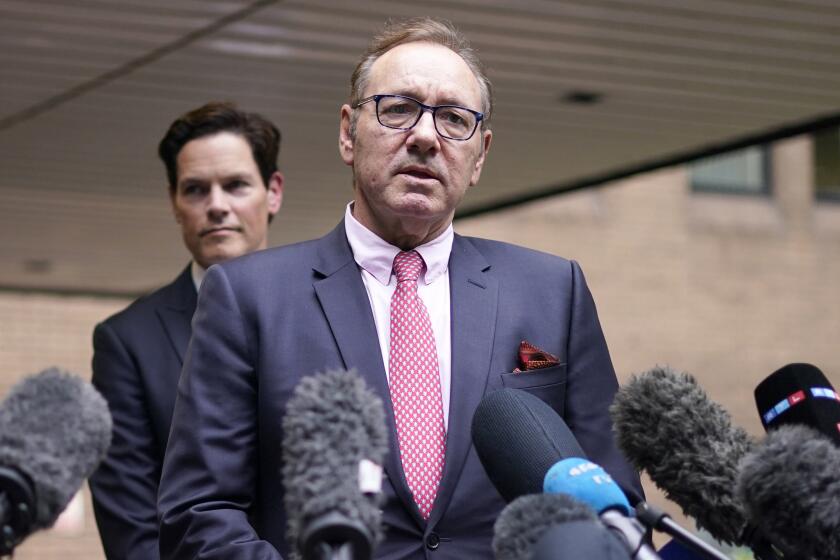MCA Records Countersues Motown for $25 Million : Entertainment: The suit alleging breach of contract and malicious conduct comes two weeks after a filing against the distributor.
The dispute between Motown Record Co. and its distributor, MCA Records, intensified Tuesday as MCA countersued Motown and its majority owner for breach of contract and malicious conduct.
MCA said it is owed millions of dollars by Boston Ventures Management Inc., which owns 70% of Motown. Boston Ventures is also accused of interfering with MCA’s management of the small label and with “preventing Motown from realizing profitable business opportunities.”
The MCA claim comes in response to a Motown suit two weeks earlier that accused MCA of “ineptitude and deliberate misconduct.” The company charged that MCA had botched the promotion of Motown songs to pop radio stations, mismanaged the distribution of the sound track to “Do the Right Thing” and overcharged Motown for compact discs.
MCA has denied any wrongdoing. In its counterclaim, the company contends that the Motown suit was part of a “scheme” by Boston Ventures to improve its contractual agreement. MCA claims that Boston Ventures bought Motown with the idea of reselling it for a quick profit.
“The suit continues frantic attempts by Boston Ventures to improperly appropriate MCA’s valuable rights for itself, with the goal of then using those rights to enhance the resale value of its interest in Motown,” said MCA, which is seeking more than $25 million in damages.
MCA’s heated criticism of Boston Ventures and its business practices includes repeated references to the company’s ownership of the supermarket tabloid National Enquirer, as well as to Boston Ventures’ past practice of buying and quickly selling entertainment properties.
Boston Ventures, in a prepared statement, branded MCA’s suit a “poor attempt at psychological warfare.”
“Once again, MCA is dragging the red herring of Boston Ventures across the trail in an attempt to divert public attention from the lawsuit Motown has filed against MCA,” Boston Ventures General Partner Martha Crowninshield said.
Motown President Jheryl Busby said in a statement that the dispute was not between MCA and Boston Ventures but instead concerned “MCA’s failure to live up to its contractual obligations to distribute and promote Motown records.” Sources said relations between Motown and MCA have steadily deteriorated since Motown was sold for $61 million in 1988.
MCA took an 18% stake in the label, best known for such 1960s hits as “I Heard It Through the Grapevine,” at the time. The entertainment giant, a unit of Matsushita Electric Industrial Co. of Japan, also signed a deal to distribute and promote Motown records in return for 25% of all revenue.
The deal is considered rich by industry standards. But MCA maintains that the agreement provides Motown with support services not included in a standard distribution deal. Zach Horowitz, executive vice president for the MCA Music Entertainment Group, said MCA has every interest in Motown’s success.
“We have a long-term commitment to Motown,” Horowitz said. “We believe very strongly in the Motown legacy, and we have continued to invest in Motown.”
Horowitz said MCA tried to reach an accord with Boston Ventures before the dispute ended up in the courts. The possibility of MCA buying all or part of Boston Ventures’ stake in the small label has not been discussed, said Horowitz, who added that MCA intends to hold Motown to its contract.
MCA’s suit charges that Boston Ventures has consistently violated the contract by excluding MCA from meetings at which “vital operating decisions were made,” by withholding critical partnership information, by excluding MCA from participation in the selection of key executives and by granting equity interests in the label to Motown executives without MCA’s knowledge.
MCA says it has proven its commitment to Motown by assigning popular recording artists such as Johnny Gill to the label. MCA also claims to have contributed $5 million in interest-free working capital, plus millions of dollars in additional loans and deferred fees to Motown.
More to Read
The biggest entertainment stories
Get our big stories about Hollywood, film, television, music, arts, culture and more right in your inbox as soon as they publish.
You may occasionally receive promotional content from the Los Angeles Times.






